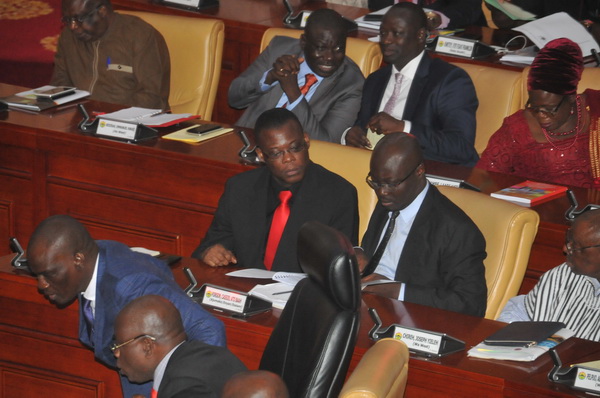
Budget review: Govt increases VAT through ‘back door’ - Minority
The Minority in Parliament has accused the government of increasing the Value Added Tax (VAT) through the ‘back door.’
It said the deception would fall flat and Ghanaians would bear the brunt of the increases.
It said the announcement by the Minister of Finance, Mr Ken Ofori-Atta-Atta, to change the 2.5 per cent Health Insurance Fund Levy (HIFL) and the 2.5 per cent Ghana Education Trust Fund (GETFund) levy on VAT into a flat levy would increase the tax liabilities of manufacturers, wholesalers and retailers.
It said the prices of goods and services would definitely go up with the implementation of the ‘new VAT policy’.
The Minority Leader, Mr Haruna Iddrisu; the Deputy Minority Leader, Mr James Avedzi, and the Ranking Member on the Finance Committee and Minority Spokesperson on Finance, Mr Cassiel Ato Forson, spoke in separate interviews with the Daily Graphic after the Finance Minister had presented the mid-year fiscal policy review of the 2018 budget statement and economic policy of the government in Parliament in Accra yesterday.
In his presentation, Mr Ofori-Atta said the government was consolidating contributions to the HIFL and the GETFund portion of VAT into a separate Health and Education Levy.
"This will enable the government to isolate and increase the budget for health and education. Both the HIFL and the GETFund levies will continue to be 2.5 per cent each, while the applicable VAT rate is 12.5 per cent," he said.
Minority Leader raises issues
Mr Iddrisu said with the announcement of the VAT policy shift, there would be changes in the VAT Law.
That, he said, would lead to an increase in tax liability for manufacturers, wholesalers and retailers between input VAT of 12.5 per cent and value added at 17.5 per cent.
“A review and amendment of the law will expose the minister and the government," he said.
Mr Iddrisu, who is the Member of Parliament (MP) for Tamale South, said Mr Ofori-Atta did not comply with Section 28 (1) (c) of the Public Financial Management Act (PFMA) when he used data from January to May 2018.
He said the law required the minister to use data for six months and indicated that "we (the Minority members) cannot rely on his
He said Mr Ofori-Atta presented a pick-and-choose budget, taking credit for the supposed positives and shifting the goal posts with the downsides.
"He came to present a cherry pick-and-choose budget. Where it is good, he says we have done well, and where it is bad, he says challenges," he said.
For instance, Mr Iddrisu said, Mr Ofori-Atta attributed the depreciation of the cedi to external pressure.
Again, he said, the minister rather spoke of huge arrears in the payment of allowances to teachers and nurses and indicated that Minority members would be measuring him by honouring the obligations to teachers and nurses, instead of the reference to arrears.
On growth, the Minority Leader said the New Patriotic Party (NPP) pledged double-digit growth of the economy in its manifesto but that was not the case now.
"It is not what we are witnessing and they themselves are projecting a decline in growth (non-oil) between now and 2020," he said.
He said Mr Ofori-Atta was silent on how the government was addressing growing unemployment and hopelessness among the youth, especially school leavers.
"The International Monetary Fund (IMF) even today notes a decline in revenue and its consequence on fiscal stabilisation," he said.
The tax "imposition"
Mr Avedzi wondered why the government would change the TAX policy if there was no difference.
"Is it just a change of name or semantics? No, the minister, in his presentation, said the policy of changing from VAT to a flat rate or levy of 2.5 per cent was bringing in additional revenue to the government. Who is paying that additional revenue? The people of this country — you and me who consume,” he said.
He said the prices of goods and services would go up as soon as the implementation of
Mr Avedzi, who is the MP for Ketu North, said with the new VAT system, wholesalers would apply VAT on the total cost of goods on the consumer, but the VAT paid on the goods to the government would not be refunded to the wholesaler, as was the case now.
No celebration yet
Explaining further, Mr Forson said a VAT registered person had the opportunity to offset his input VAT against his output VAT and pay the difference to the government.
However, he said "now that five per cent has become a straight line levy and has been exempted from
"The truth is that it is an imposition of
